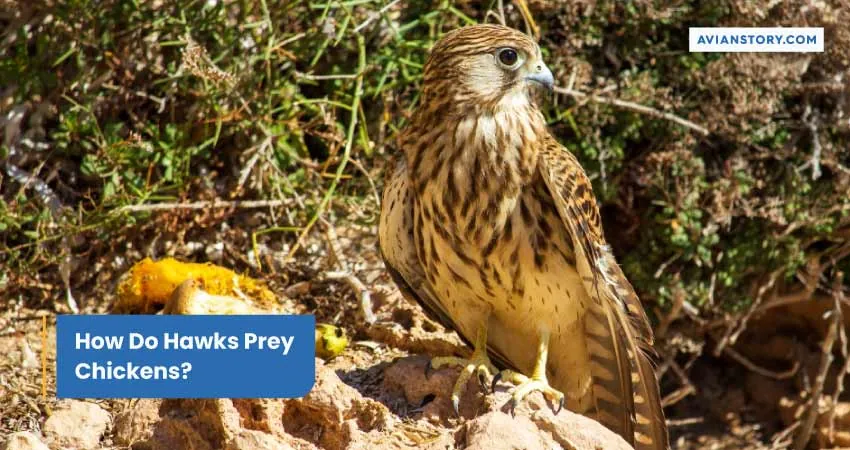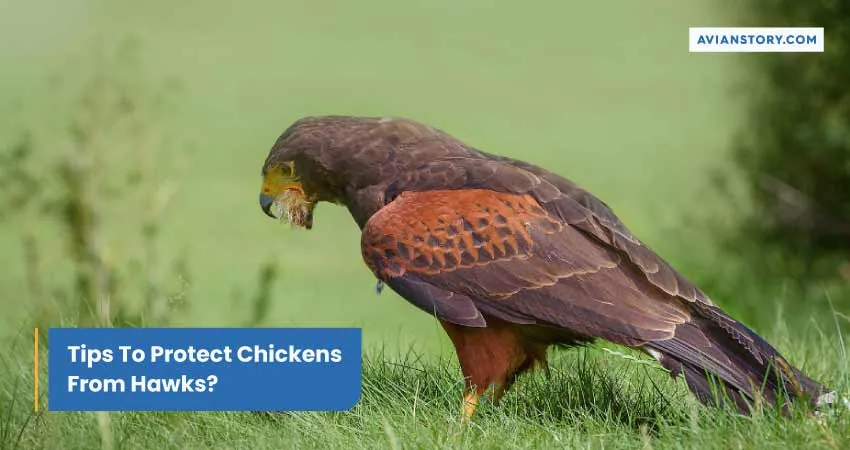Do Hawks Eat Chickens? How to Protect Your Chickens
You must have heard poultry owners complaining their chickens have been attacked by hawks. But do hawks really eat chickens? If yes, then is there any way to protect chickens from this deadly hunter? Today I’m going to break down this topic and clear all of your queries.
Hawks eat chickens. In fact, they are among the favorite diet of hawks. If hawks find any chicken roaming openly, they will surely attack it. At first, they will target the chicken, then swoop down and attack it with full force through its sharp talons. After that, they carry it somewhere else to enjoy it in peace.
In this article, I will give you a closer look at how hawks prey on chickens so that you can identify a hawk’s attack. And if you have noticed this predator in your area, how you can protect your chicken. So, stay tuned till the end to learn how to keep your chickens safe from deadly hunter hawks.
Why Do Hawks Attack Chickens?
Hawks attack chickens primarily because they are predators by nature, and chickens fall into their category of prey. These birds of prey are opportunistic hunters and are always on the lookout for available food sources. Chickens, often smaller and less equipped to defend themselves, present an easy target for hawks, especially in open areas where they can’t easily hide or seek shelter.
Several factors can make chickens particularly vulnerable to hawk attacks:
- Visibility: Chickens that are free-ranging in open spaces are more visible to hawks flying overhead.
- Lack of Shelter: Without adequate cover or places to hide, chickens are easily accessible to these agile predators.
- Size and Defense Mechanisms: Chickens are relatively small and lack the defense mechanisms to fend off aerial predators effectively.
- Routine: Hawks may observe and learn the routines of a yard or farm, striking when chickens are most vulnerable.
- Habitat Encroachment: As human populations expand, the natural habitats of hawks are often encroached upon, leading them to hunting in new areas, which can include places where chickens are kept.
Understanding that hawks hunt not out of malice but out of a need to survive can help chicken keepers take compassionate steps to protect their flocks without harming the hawks. Creating a safer environment for chickens with plenty of cover and supervision can reduce the likelihood of hawk attacks.
How Do Hawks Hunt Chickens?
Hawk hunt in daylight. To look for prey as they fly high or sit on a higher tree. As soon as they notice one, they will swoop down and attack it with full force.
They use this same approach for chickens. Whenever they trace a chicken, they would observe its movement. Focusing on the target, they would wait for the right time and opportunity to attack. As soon as they get the opportunity, they instantly attack it with full force.

They use their sharp curved talons to give deep wounds on the back and breast of the chicken. It’s like stabbing the chicken with a knife. Then they use their force to squeeze their prey to confirm its death. Sometimes, they would even start eating the dying ones.
All this happens in just a blink of an eye. So the victim doesn’t get enough time to give any reaction or defend itself.
Hawks usually kill chickens in the first hit. So you will not find any clue of scuffling or fighting at the spot.
After killing it, hawks usually prefer to take it elsewhere, like high trees or mountains, so that it can enjoy its meal in peace. If it’s not small enough for them to carry, they will start eating it on the ground.
Hawks are one of the most intelligent and clever birds. When they have succeeded in hunting a chicken from a poultry farm, there is an absolute chance that they will come back for another one.
So if you have detected any hawk attack in your poultry, assume that that predator is going to attack again. Before that, make sure you have taken enough safety measures to protect your chickens.
Can You Kill a Hawk if it’s Threatening Your Flock?
In the United States, hawks and other birds of prey are protected under the Migratory Bird Treaty Act of 1918. It is illegal to harm, kill, or keep them without a permit. This means that if a hawk or other raptor is threatening your flock, you cannot harm the bird legally.
Instead of lethal measures, you should employ non-lethal methods to protect your chickens. This can include securing your chickens in a covered pen, using scare tactics, or employing guard animals.
If you’re experiencing persistent problems with a hawk, you can contact your local wildlife agency for further assistance and advice. They can provide you with the best practices for protecting your livestock while also complying with wildlife protection laws.
How To Protect Chickens From Hawks?
Have you spotted any hawk flying overhead or sitting in any nearby trees? If you got some guest birds of prey in your area, it’s a big threat to your flocks.
Seeing some running chickens would be more than tempting for a hungry hawk. As per their nature, they will definitely take advantage of it.

So you have to systematically plan and take enough security measures to save your chickens from flying predators like a hawk.
According to federal law, you are not allowed to physically warm any hawk or other birds. So how to protect chickens from hawks?
Here is a list of some effective tips to protect chickens from deadly hawks.
1. Adding A Secure Cover
Keeping chickens in an open place means inviting predators. It becomes much easier for a hawk to hunt a chicken when it’s roaming openly.
So first, what you have to do is put a secure cover between the hawk and your chickens. There are some options for that.
If you don’t let your chickens graze and keep them in a small coop, then make sure all sides, particularly over the top of the coop, are protected with a cover. You can use a plastic cover that comes with holes for the top of the hen house. For the sides, you can choose a colorful rope net.
It takes some extra effort to protect free-range chickens. You can use a colorful rope net (particularly eye-catchy bright colors like orange or magenta) over the top of the area. It will prevent hawks from swooping down and attacking your chickens.
Make sure the cover’s holes are not too big so that a hawk can come through.
2. Securing The Feeding Area
The hawks are clever. They observe their prey’s movement and wait for the right opportunity to attack.
When chickens eat, they need to keep their head down. So it is the perfect opportunity for a hawk to attack chickens.
To protect chickens from such situations, you can keep the feeder inside the hen house.
If you let your chicken graze in any open area, you have to cover the feeding space so that hawks can’t see your chicken during feeding.
3. Consider Adding a Predator Decoy
Employing a decoy that resembles a bird of prey can be an effective yet non-invasive method for bird control. Market options include owl or hawk figures, which deceive other birds into believing the area is already dominated by a predator. However, keep in mind that these decoys may inadvertently cause distress to your chickens. If you observe any signs of stress among them, swapping to a human-like scarecrow might be a suitable alternative.
It’s worth noting that the effectiveness of these decoys may diminish over time as local birds may recognize that the statues pose no real threat. To maintain the ruse, it’s beneficial to introduce some movement. This can be achieved by either purchasing a decoy that moves or by regularly altering the position of your static decoy, ideally every couple of days.
4. Using Shiny Stuffs
Sometimes shiny pieces of stuff can be an effective way to keep hawks away. You can hang CDs, DVDs, or tape that will reflect sunlight.
This would work on migratory hawks. Local hawks that always see these things would get used to it. So this trick won’t work on them.
5. Using Noise
It is said that hawks get irritated by loud noise. Though some poultry owners say so, there has been no research on this. So it’s totally up to you whether you want to implement this trick or not.
But let me assure you, it actually works with wild hawks. Because they are not used to it. This trick won’t work with urban hawks.
Don’t use the same sound over again. Instead, switch the sound after a few days.
6. Introduce a Protective Companion
Incorporating a guardian animal into your farm can be a natural deterrent for hawks and a safeguard for your chickens. A medium-sized or large dog often serves as an effective deterrent against hawk attacks. Allowing your chickens to roam while a dog — one that is accustomed and friendly to the chickens — is present outdoors can ward off various predators, including hawks.
For those managing a chicken coop, considering the addition of a rooster could be beneficial. Despite some hesitancy due to their aggressive nature and the possibility of ending up with fertilized eggs, roosters are known to be vigilant guardians for hens. They often take on the role of watchful sentinels, and their distinctive calls can alert the entire flock — as well as their human caretakers — to the presence of danger. Intriguingly, roosters have a unique alert for airborne threats, different from the one they use for terrestrial predators like foxes.
7. Provide Alternative Food Sources
Providing alternative food sources can be a strategy to distract hawks from preying on your chickens. Here’s how this can be implemented effectively:
Strategically Place Bird Feeders: Setting up bird feeders at a considerable distance from the chicken coop can attract hawks to a different location. This keeps them focused on the smaller birds that frequent these feeders, rather than the chickens.
Create a Diverse Ecosystem: Encouraging a healthy population of small wild birds and rodents through habitat creation can provide a more natural food source for hawks. This includes planting native shrubs and trees, and maintaining areas with tall grasses to attract and support a variety of wildlife.
Understand Hawk Behavior: Since hawks are natural hunters, they prefer live prey. Bird feeders might attract small birds, which in turn could attract hawks, but this isn’t a foolproof method. Hawks may still choose to hunt for live prey like chickens if the opportunity arises.
The most effective way to ensure the highest safety of your chickens is to combine all the above tips altogether. Securing run and feeding areas and using noise, sound, scarecrows, and deterrents of Owls or Eagles altogether will definitely keep hawks away from your chicken.
Will a Hawk Keep Coming Back for More Chickens?
Yes, a hawk may repeatedly return to a location where it has successfully found food. If a hawk discovers chickens in a particular area, it may consider this spot a reliable food source and continue to come back as long as the food supply (in this case, the chickens) is available. Implementing protective measures for your chickens is essential to deter the hawk from returning.
Final Words
Chickens are among hawks’ favorite diet. As opportunities, they will surely attack any chicken roaming openly.
To save your chicken from this deadly predator, you need to take enough security measures that would protect your chicken and, at the same time, won’t hurt hawks or other flying predators.
In this article, I’ve covered some mostly used and effective ways to keep hawks away and protect chickens. Consider these tips whenever you see any hawk flying over your head. Hope it helps.
